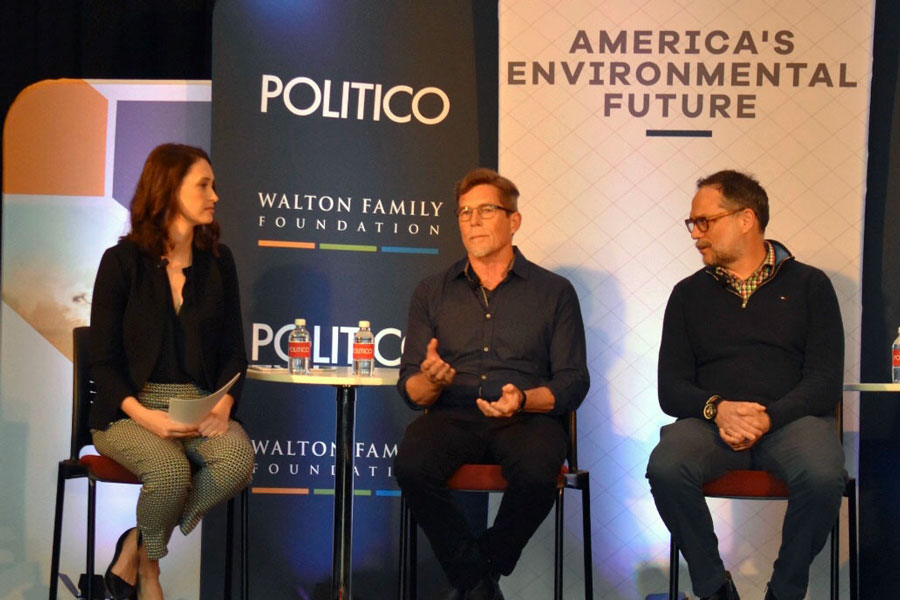Panelists examine adapting food systems to mitigate climate change
Maia Spoto/The Daily Northwestern
From left to right: Liz Crampton, Rick Bayless and Rodger Cooley. Crampton, a Politico agriculture reporter, moderated the panel “On the Menu — The Food System of the Future.”
March 3, 2020
Food industry leaders considered harnessing local farmers, plant-based diets and urban farming to maximize environmental sustainability in a Tuesday Politico Live event at Loyola University Chicago.
Liz Crampton, a Politico agriculture reporter, moderated the discussion, “On the Menu — The Food System of the Future.” She said a 2019 report in The Lancet medical journal called for a 50 percent reduction in the world’s current intake of red meat and sugar to fight global warming and benefit human health.
“More people are making the connection between what we eat and how it impacts the environment,” Crampton said.
Chef Rick Bayless was one panelist examining the intersection of food production and sustainability. He said his work with local farmers has impacted his perspective on environmentalism. Bayless founded the Frontera Farmer Foundation, which awards grants to small Midwestern farms.
He said fostering a closer relationship between food producers and consumers will maximize food’s cultural value and minimize food waste.
“We never use the word ‘commodity’ in our restaurants, because that really demeans what that stuff is,” Bayless said. “I think that really demeans what (the food) is. Even if it has come from a commodity farm, somebody was actually planting that stuff, watering that stuff, harvesting that stuff… it’s something that somebody has nurtured along to nurture us.”
He said people can respect food by cooking at home regularly and learning to incorporate a variety of ingredients, rather than throwing away products that have surface-level blemishes. Additionally, Bayless advocated for “lean, everyday eating” practices, in which individuals consume little to no animal protein during weekdays. He said plant-based weekday plates can balance out heartier weekend “feasting.”
Erin Fitzgerald, CEO of U.S. Farmers and Ranchers Alliance, said the agriculture industry can embrace both plant- and animal-based options to practice sustainability while preserving consumer choice. She said farmers can use marginal dairy farm land to grow other foods. Fitzgerald also said dairy cows play a role in upcycling, among other environmental benefits.
“Having a conversation about ‘either-or’ is probably not the right conversation,” Fitzgerald said. “It’s more of an ‘and’ conversation.”
Fitzgerald added that farmlands need business protections so they can continue providing ecosystem services through carbon sequestration and animal habitat preservation.
Rodger Cooley, the executive director of Chicago Food Policy Action Council, said sustainable food systems need to evaluate their impact on communities of color and empower marginalized groups to take on leadership roles.
Furthermore, Cooley said an increased focus on urban farming can offer a solution that promotes both sustainability and equity.
“Start seeing broadly,” Cooley said. “How do we reimagine our community? We have all these empty lots because of years of disinvestment. How do we start taking control of these spaces that we didn’t have before, and really use them as a space to create community health?”
The Walton Family Foundation sponsored the panel. Alongside work in other sectors like education, the foundation supports conservation and food production efforts by working with farmers and fishermen in their ecosystems.
Crampton also announced that Politico will launch a new coverage area focusing on sustainability within its policy reporting organization, Politico Pro.
Email: [email protected]
Twitter: @maia_spoto


